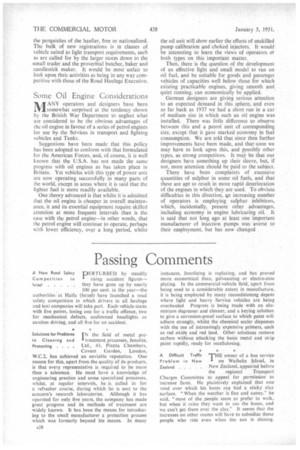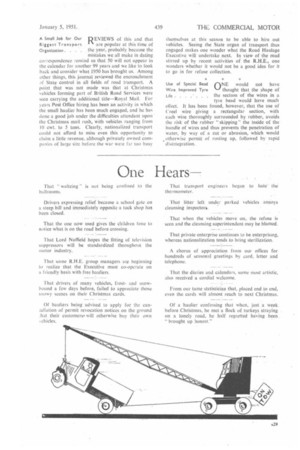Passing Comments
Page 30

Page 31

If you've noticed an error in this article please click here to report it so we can fix it.
A New Road Safety PERTURBED by steadily Competition in I • rising accident figures— Israel they have gone up by nearly
100 per cent. in the year—the authorities at Haifa (Israel) have launched a road safety competition in which drivers in all haulage and taxi companies will take part. Each vehicle starts with five points, losing one for a traffic offence, two for mechanical defects, undimmed headlights or careless driving, and all five for an accident.
Solutions for Problems IN the field of metal pre
in Cleaning and 1 treatment processes, Ienolite, Protecting . . . . Ltd.. 43, Piazza Chambers, Covent Garden, London, W.C.2, has achieved an enviable reputation. One reason for this, apart from the quality of its products, is that every representative is required to be more than a salesman. He must have a knowledge of engineering practice and some specialized processes, whilst, at regular intervals, he is called in for a refresher course, during which he is sent to the concern's research laboratories. Although it has operated for only five years, the company has made great progress and its methods of treatment are widely known. It has been the means for introducing to the small manufacturer a protection process which was formerly beyond his means. In many instances, Ienolizing is replacing, and has proved more economical than, galvanizing or electro-zinc plating. In the commercial-vehicle field, apart from being used to a considerable extent in manufacture, it is being employed by many reconditioning depots where light and heavy Service vehicles are being overhauled Progress is being made with an aluminium degreaser and cleaner, and a keying solution to give a corrosion-proof surface to which paint will adhere strongly, whilst the chemical sealer dispenses with the use of increasingly expensive primers, such as red oxide and red lead. Other solutions remove carbon without attacking the basic metal and strip paint rapidly, ready for reeellulosing.
A Difficult Traffic THE owner of a bus service Problem in New I on Waiheke Island, in
Zealand . . . . New Zealand. appeared before the regional Transport Charges Committee to appeal for permission to increase fares. He plaintively explained that one road over which his buses ran had a sticky clay surface. "When the weather is fine and sunny." he said, "most of the people seem to prefer to walk, but when it rains they want to use the buses, and we can't get them over the clay." It seems that the increases on other routes will have to subsidize those people who ride even when the sun is shirliag.
A Small Job for Our REVIEWS of this and that Biggest Transport " are popular at this time of Organization. . . the year,probably because the mistakes we all make in dating. correspondence remind us that 50 will not appear in the calendar for another 99 years and we like to look back and consider what 1950 has brought us. Among other things, this journal reviewed the encroachment if State control in all fields of road transport. A point that was not made was that at Christmas vehicles forming part of British Road Services were seen carrying the additional title—Royal Mail. For years Post Office hiring has been an activity in which the small haulier has been much engaged, and he has done a good job under the difficulties attendant upon the Christmas mail rush, with vehicles ranging from 10 cwt. to 5 tons. Clearly, nationalized transport could not afford to miss even this opportunity to claim a little revenue, although privately owned companies of large size before the war were far too busy
themselves at this season to be able to hire .out vehicles. Seeing the State organ of transport thus engaged makes one wonder what the Road Haulage Executive will undertake next. In view of the mud stirred up by recent activities of the R.H.E., one wonders whether it would not be a good idea for it to go in for refuse collection.
Use of Special Bead rINIE would not have Wire. improved Tyre thought that the shape of Life the section of the wires in a
tyre bead would have much effect. It has been found, however, that the use of Creel wire giving a rectangular section, with each wire thoroughly surrounded by rubber, avoids the risk of the rubber "skipping" the inside of the bundle of wires and thus prevents the penetration of water, by way of a cut or abrasion, which would otherwise permit of rusting up. followed by. rapid disintegration.




















































































